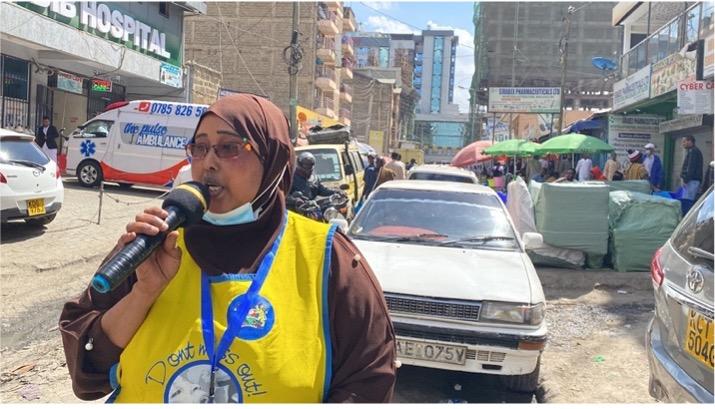On the Frontlines: Mobilizing Nairobi's Communities Against Polio

Summary
This article tells the story of Fatuma Mohamed Ahmed, a dedicated community health mobilizer in Nairobi, and her efforts to combat polio through community engagement and education.
On the Frontlines: Mobilizing Nairobi's Communities Against Polio
At the heart of Eastleigh, Nairobi, is Fatuma Mohamed Ahmed, a 28-year-old compassionate UNICEF supported community health mobilizer to making a positive impact in her community during polio campaigns. Draped in a modest Hijab, Fatuma not only upholds cultural values but actively champions health awareness within the Somali community. Going beyond the role of a mere worker, she becomes a guiding force, bridging the gap between traditional practices and modern health concepts especially for oral polio vaccine and routine immunization. Her focus is particularly sharp when it comes to empowering pregnant and lactate mothers and children under five years with insights into well-being.
As the eldest among her four brothers and three sisters, Fatuma resides with her father, Mohamed Ahmed, in Eastleigh, Kamkunji sub-county. The family confronts significant challenges, particularly the health struggles of her mother, who battles diabetes and hypertension. Motivated by these adversities, Fatuma chooses a path in community health, fueled by a desire to contribute meaningfully to the well-being of her family and the broader community.
Amidst the backdrop of Kenya being one of the 35 polio outbreak countries globally, grappling with circulating vaccine-derived poliovirus type 2 (cVDPV2), Fatuma faces a unique challenge. In Eastleigh, where many Somalis reside and conduct business, some families harbor fears and reservations about administering polio vaccines to their children, particularly in Eastleigh North. Fatuma, hailing from the same community, encounters doubts and resistance in her efforts to safeguard children from polio.
Community Challenges
Being a helper comes with its share of challenges. On the streets, she endures judgmental glances and hurtful comments, as societal norms cast doubt on the appropriateness of certain jobs for women especially when she is advocating vaccination against polio virus. Undiscouraged, Fatuma perseveres, earning respect through her honesty and hard work.
Fluent in Somali, Borana, Oromo, Kirahwen, Kiswahili, and English languages, Fatuma effectively establishes inter-personal communication with women in diverse communities. Even outside polio campaigns, she engages with families, attentively addressing their concerns. Fatuma firmly believes in the power of dialogue, patiently explaining the critical importance of polio vaccines, also known as OPV.
Her friends affectionately call her "Shakaroon" in Somali, meaning "better than five." Fatuma's dedication extends beyond polio campaigns to assisting pregnant and lactate women. She educates them on antenatal care, emphasizing the benefits of delivering babies in government hospitals like Pumwani, where delivery is free.
Her caring nature transcends duty, reaching into narrow streets and busy homes in Eastleigh. Fatuma Mohamed Ahmed isn't just a community health mobilizer; she's a compassionate force, consistently advocating for the health of her community. Her story resonates through the streets, illustrating that strength and dedication can indeed make a significant difference, especially in the context of polio vaccination and overall community health.
Government and UNICEF Efforts
Recognizing the gravity of the polio situation in Kenya, the government, in collaboration with UNICEF and other development partners, conducted three special rounds of polio vaccinations in high-risk areas, including Nairobi County. These initiatives, known as "SIAs" or Supplementary Immunization Activities, represent a collective effort to ensure children receive the oral polio vaccine, safeguarding the health of the community.
Conclusion
Fatuma Mohamed Ahmed's story exemplifies the impact of dedicated community health mobilizers in overcoming challenges and driving positive change. Her work, alongside government and UNICEF efforts, underscores the importance of community engagement and strategic interventions in combating polio and enhancing public health.
By: Farhat Mahdi, SBC Consultant, CDC - STOP Team #54 Kenya

